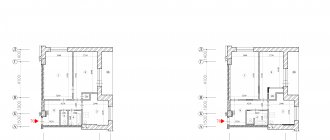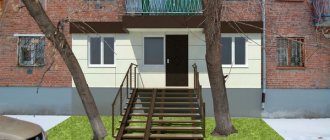Very often, entrepreneurs, especially beginners, are faced with the problem of where to open their own office or store? Often the profitable and only option is to transfer residential premises to non-residential premises if this premises is owned. In essence, this procedure gives the apartment the status of commercial real estate.
Content
- What does the law say about this?
- We comply with all necessary legal regulations
- Is it possible to engage in commercial activities without converting an apartment into commercial real estate?
- What are the technical aspects of this action?
- Converting an apartment to non-residential premises: step-by-step instructions
- What costs will you incur during the entire procedure?
Many people wonder whether it is profitable to convert their home into commercial real estate? The answer is obvious, it is really profitable. If you compare this method of locating your own business with renting an office in the city center (the cost of which, by the way, is quite high) or with the construction of a new building, you can immediately see the advantages of transferring housing to commercial premises.
The only thing that can become an obstacle is the rather complicated and lengthy registration procedure. This article will help you clarify and create your own action plan.
✅ How to transfer an apartment without consent?
Previously, there were still violations that bypassed the rules - the new Federal Law No. 116 eliminated them. Now it is impossible to transfer housing to non-residential premises without the consent of the owners of the house. Especially without the OSS protocol, where the fate of common property is decided.
Expert opinion
Semyon Frolov
Lawyer. 7 years of experience. Specialization: family, inheritance, housing law.
How to solve problems with apartment building residents:
- Prepare a detailed reconstruction project, describe what needs to be done, whether it is necessary to use the common area of the house, how long the work will take, whether there will be any inconvenience for residents, etc.
- Organize a house-wide meeting of residents, invite those who live in the entrance (especially neighbors on the first floor). Difficulties almost always arise: some are not at home, others are at work, others don’t have time, others don’t go to meetings at home...
- Tell us about the reconstruction project, find out the opinions of residents - even if they have complaints, you will be able to hear them first-hand. Disagreements will have to be resolved promptly, on the spot.
- Offer those who disagree your option, for example - to take on the costs of maintaining the local area (plant trees, trim bushes, remove garbage, update the path, build in sound insulation, install new windows in the entrance).
Most likely, you will have to negotiate with someone individually. Practice shows that there are those who disagree with the translation in every home. If their apartments are located next door, negotiations will drag on. It’s easier if the neighbors agree and you need to secure more than 50% of the votes on the OSS at home.
If you are one of the apartment owners and do not want someone to transfer the neighboring apartment to a store or cafe, do not ignore the general building meeting . Be sure to visit OSS on the appointed day. Vote as you see fit - you don't have to agree to all the terms. Well, if your apartment is adjacent to the original one, you can simply not give consent. Knowing that a hairdressing salon, khinkal salon or hookah club will be installed at the place of housing, you have the right to refuse.
Legal innovations have complicated the process of converting housing into non-residential properties.
Now, among other things, they require minutes of the meeting and the consent of neighbors. Not everyone knows how to quickly resolve a situation in their favor. For example, they often collect consent from ⅔ of the owners at the entrance, but in fact they need the same amount from the residents of the entire house. Or they don’t know how to organize a meeting in the case of a thousand apartments in an apartment building. The lawyers of our site will tell you about all the nuances of consent. Contact us with a question and you will receive an answer as soon as possible. Competent consultation will simplify the solution of the problem, avoid risks and failures. Attention!
- Due to frequent changes in legislation, information sometimes becomes outdated faster than we can update it on the website.
- All cases are very individual and depend on many factors. Basic information does not guarantee a solution to your specific problems.
That's why FREE expert consultants work for you around the clock!
- via the form (below), or via online chat
- Call the hotline:
- 8(800)302-39-65
— All residents of the Russian Federation - +7(495)128-69-80
— Moscow and the Region - +7(812)509-13-65
— St. Petersburg and region
- FREE for a lawyer!
By submitting data you agree to the Consent to PD Processing, PD Processing Policy and User Agreement.
Anonymously
Information about you will not be disclosed
Fast
Fill out the form and a lawyer will contact you within 5 minutes
Tell your friends
Rate ( 1 ratings, average: 5.00 out of 5)
Author of the article
Maxim Privalov
Lawyer. 2 years of experience. I specialize in civil disputes in the field of housing and family law.
Author's rating
Articles written
614
What does the law say about this?
First of all, you need to refer to the legislative acts of the Russian Federation. Having studied the existing regulatory aspects, one can come to a disappointing conclusion: residential premises must be used only for living in it.
But don't be upset. There is the possibility of converting housing into commercial real estate, which will ultimately allow you to work from your home.
It is very important that the interests of all other residents living in the house are taken into account. Not a single right of theirs should be violated.
Many people mistakenly believe that the consent of all neighbors to transfer housing to commercial real estate is a prerequisite. Actually this is not true. However, if any controversial issues arise, the consent of your neighbors can have a serious impact, moving the arrow of the scale in your favor.
What problems may arise during translation?
As stated above, reconciliation of translations is an extremely complex procedure. The following problems may occur:
- refusal by the owners of the apartment, adjacent premises, apartment buildings for translation and redevelopment work;
- inability to ensure safety standards, which threatens the stability and strength of the house;
- unsatisfactory condition of structures, which impedes work;
- impossibility of circumventing work bans during redevelopment.
In each specific case, you need to decide how to circumvent these difficulties. For example, the refusal of the owners of apartment buildings to give consent cannot be appealed . Therefore, the customer will have to look for a compromise and convince him to agree, otherwise all subsequent stages will not make sense. Restrictions on construction work can be circumvented by choosing other solutions and refusing individual changes.
Is it permissible to transfer a residential building to a non-residential building?
The purpose (functional) purpose of buildings may also change. In this case, the transfer of the housing stock to non-residential is possible if all the apartments in the apartment building are resettled. After resettlement, the owner of the building will become the owner of all premises and will make decisions about the future fate of the property.
Coordination may include obtaining permission for reconstruction if such work is carried out. If redevelopment is sufficient for the transfer, it does not need to be approved in a non-residential building. The functional purpose of the building must be changed through Rosreestr.
At the final stage, the owner will receive an extract from the Unified State Register. In this example, the intended purpose of the object is “residential premises, apartment”. After all approvals, it will be changed to the status of “non-residential premises”.
We comply with all necessary legal regulations
Converting an apartment to commercial real estate is not possible without meeting the following legal requirements:
- The housing must be owned by the applicant. This, of course, must be a legal entity. It is necessary to have written confirmation that the apartment is owned. It could be:
- will;
- gift agreement;
- registration certificate.
- This apartment should not be taken out on credit or used as collateral. Supervisory authorities are very careful to ensure that the property is legally “clean”. She should not be involved in any fraud under any circumstances.
- An apartment can be transferred from residential to non-residential status only in full, and in no case partially.
- The owner must check out of the apartment before starting the procedure for changing its status. According to the law, no one can be registered in a non-residential premises, and no one can live there permanently.
- If any illegal alterations have been made to the apartment, they must be legalized without fail. Otherwise, the transfer will simply not be given the go-ahead.
Conditions of the procedure
The procedure is permissible if the conditions specified in Art. 22 Housing Code of the Russian Federation:
- The premises must be equipped with an independent entrance from the street - it is necessary to ensure the isolation of the facility. With an area of over 100 sq. meters, an emergency exit is needed.
- The object is located on the first floor. If it is located higher, the remaining premises should be non-residential.
- It is prohibited to create obstacles to the use of common property by other citizens (for example, blocking a passage), or to dismantle structures and networks belonging to a single system.
- Activities related to translation should not provoke the threat of collapse of the house or reduce its reliability.
Attention! Residential premises are converted into non-residential premises and, conversely, non-residential premises are completely converted into residential ones. That is, changing the status of a part or share of a real estate property is not allowed.
When is it impossible?
The procedure is not carried out if:
- A person permanently resides or is registered in the premises.
- The principle of isolation of the area (presence of a separate entrance) is not observed.
- The property is the subject of a pledge, the bailiffs intend to seize it, that is, there is an encumbrance with the rights of third parties.
- The living space is in a technically unsatisfactory, emergency condition, and is not connected to utilities.
- The apartment is located in a building that serves as a cultural site.
- The room acts as part of the object.
- Housing is located in a rented social housing building.
- The premises are intended for religious activities.
- Neighbors did not express their approval.
Is it possible to engage in commercial activities without converting an apartment into commercial real estate?
If you turn to the Housing Code of the Russian Federation, you can find a number of conditions, subject to which it is possible to carry out your activities without being classified as commercial real estate (Article 17). These requirements include the following conditions:
- This activity should not make the lives of other residents of the apartment and neighbors worse.
- There will be no complaints from neighbors regarding business activities.
- The house is not in disrepair.
- All sanitary and epidemiological requirements in the apartment are met.
- The business owner has permanent residence in the apartment.
And yet, entrepreneurs are almost always forced to convert housing into commercial real estate.
conclusions
- The transfer of premises from residential to non-residential is permitted if such work is agreed upon with the owners of the apartment building and permission is obtained from the Moscow Housing Inspectorate.
- Permission to transfer residential premises to non-residential premises is issued on the basis of the project and technical requirements. conclusion, minutes of the meeting of residents of the house.
- To obtain approvals, you must comply with the restrictions and prohibitions specified in the Housing Code of the Russian Federation and regional regulations.
You can learn more about the nuances of approvals from our real estate experts.
What are the technical aspects of this action?
And again you need to turn to the Housing Code of the Russian Federation. It specifies quite stringent requirements that apply not only to housing, but also to the entire house. These include the following aspects:
- Direct entrance to the premises from the street is required, if possible. In this case, it means that the apartment is located on the ground floor, and the windows face directly into the courtyard. There is also an additional requirement. If the total area of the apartment exceeds 100 m2, then there must be another emergency exit through the entrance.
- If housing located above the 1st floor is being transferred, then all premises located below must also have the status of commercial real estate.
- Housing must be equipped with all engineering and technical communications that are necessary for normal functioning.
- The building where the apartment is located should not be part of the fund of cultural and historical values.
- If the house in which the property is located is declared unsafe or must be demolished, then the conversion of housing into commercial real estate is impossible.
Difficulties may arise when converting into commercial real estate an apartment located in a building that needs repairs or if it is registered with the civil defense headquarters, as well as registered in cases of emergency circumstances.
All of the above requirements are relevant for both single-story and multi-story buildings.
Don't agree with the refusal? Try to appeal it in court
The practice of courts in such cases is interesting.
Example 1:
The citizen submitted an application with the necessary documents to the district administration of the city of Novorossiysk to transfer his apartment to a non-residential property. The head of Novorossiysk issued a resolution on the transfer, as well as the need to carry out work on the project. It was planned to open a photography store in the refurbished premises. The reconstruction project required dismantling part of the non-load-bearing structures inside the apartment and making a separate entrance in place of the window, which would entail a change in the mode of use of the area under the house.
Dissatisfied residents went to court, opposing the transfer of the citizen's apartment and the reconstruction of the premises. In the example given, the court refused to grant permission to the residents of the house.
The Supreme Court of Russia (Determination No. 80-B09-26 dated January 13, 2010) expressed the following position:
- It is not necessary to obtain the consent of all owners for the transfer. It is necessary if, as a result of a change in layout or other design changes, part of the common property will be added to the residential premises.
- the court noted that the plot under the house must be formed and registered in the cadastral register. Under these conditions, the plot will belong to common shared ownership.
A similar position was expressed by the Supreme Arbitration Court of the Russian Federation (Determination No. VAS-6892/11, No. VAS-6266/10, No. VAS-7494/13).
Converting an apartment to non-residential premises: step-by-step instructions
In general, the whole process involves collecting and preparing the necessary documents and visiting the necessary authorities. To reduce translation time, you should follow the following sequence of actions.
Appeal to the Interdepartmental Commission
Only homeowners can collect all the necessary documents. The exception is a trustee. In this case, the power of attorney must be properly executed and certified by a notary. It is this paper that gives the authorized person the right to act on behalf of his principal.
Initially, you need to collect the necessary documents. Then they are provided to the property management department, which in turn relates directly to the Interdepartmental Commission. The list of documents includes:
- Power of attorney to receive documents from the BTI. To do this, contact the Property Management Department. There, an application is drawn up requesting the issuance of a power of attorney. It is this that will allow you to obtain a floor plan of the premises, as well as the explanation attached to it (decoding the symbols). Such a power of attorney is issued no earlier than 30 days later. To receive it you must present the following documents:
- passport of a citizen of the Russian Federation;
- foundation agreement for residential premises;
- property registration certificate.
- A floor plan along with an explanation, as well as a technical passport for it. These documents are issued to the BTI upon presentation of the appropriate power of attorney. To obtain it, you must provide the same documents as to the Department.
If you already have a technical passport, look at the date of issue. If the document was received more than 3 years ago, it will not be accepted. In this case, it will be necessary to obtain a new edition of the technical passport.
- Help DEZ. It must be obtained from the management company of the building where the residential property is located. This document indicates the intended use of all premises located on the floor next to your home. To receive it, you must present the same documents as to the BTI and the Department.
- Technical conclusion. To receive it, you need to contact the management company again. This could be a housing cooperative or a homeowners association, for example. This document contains all the necessary information about the technical condition of the house.
- A conclusion from the fire inspectorate that the housing actually meets all the necessary fire safety requirements. This document is issued by the Department of State Supervision under the Ministry of Emergency Situations. In this case, a prerequisite is a preliminary inspection of the premises and its verification. To do this, write the necessary application.
- Conclusion of sanitary and epidemiological control. To do this, you need to contact the SES. The procedure for obtaining it is identical to obtaining a conclusion from the fire inspectorate.
- Consent of the owners actually living in the house. Simply registered people are not taken into account. This issue is resolved at a meeting of owners. To do this, you should contact the management company again. You can try to hold an extraordinary meeting. In this case, all residents must be notified of it at least 10 days in advance. They should also be made aware of the reason for holding an unscheduled meeting. It must have at least 50% of all owners. If 2/3 agree, the decision is considered accepted.
- Extract from the house register. You can get it at the passport office. The document should not contain information that someone is registered in the apartment! This paper is only valid for 2 weeks.
- Housing renovation project. This can only be obtained from commercial organizations that have the appropriate license to carry out such activities.
Contact the Property Management Department
So, all the necessary papers have been collected at the first stage, they are all relevant. Feel free to contact the Property Management Department. There, an application is filled out indicating the desire to transfer the housing to a non-residential property. You also need to provide the same documents that were provided to obtain the power of attorney.
The consideration of this issue takes place within 45 days. After the decision is made, the applicant is notified within 3 days in person or by letter.
Why can the procedure be refused?
There are reasons why the Department may deny an applicant. These include:
- Lack of a number of necessary documents.
- Incorrect project for refurbishment of premises.
- Failure to comply with laws.
- Lack of consent of neighbors and co-owners of the apartment.
At the same time, any refusal must be justified and have references to specific regulations. Otherwise, such a decision may be appealed in court.
How much will the procedure cost?
So, consent has been received. Now you need to contact the BTI again, or rather the privatization department. In this case, you must provide the following documents:
- Application, in a strictly defined form.
- Homeowners' passports.
- Housing agreement.
- A document confirming ownership of the property.
- Floor plan, technical data sheet with explanation.
- Protocol received from the Department.
- If necessary, a power of attorney and constituent documents are provided.
After this, an appropriate calculation of the cost of the procedure for transferring residential premises to non-residential premises is made. This takes into account factors such as operating conditions, the presence of competitors nearby, the condition of the premises, and location. The final price is indicated in the protocol. Payment can be made at any of the banks.
Contact the Registration Chamber
To register ownership rights, you must contact the Registration Chamber with documents (please note that you need to provide not only copies, but also originals):
- Homeowners' passports.
- Housing agreement.
- A document confirming ownership of the property.
- Protocols from the BTI and the Interdepartmental Commission.
- Cadastral passport.
- If necessary, a power of attorney and constituent documents are provided.
The submitted application is signed by all homeowners. The execution of such a document requires the payment of a state fee. After submitting it, the authorized representative receives the document and writes a statement about when he will appear to receive the certificate. At the appointed time, the necessary certificate is issued according to the passport. This moment is considered the transition of housing to commercial real estate.
It is worth noting that renting such premises can bring much more money than residential ones.
Refusal
In case of refusal to carry out the procedure, a protocol is sent to the owner with a mandatory indication of the reason with reference to the legal act.
A negative decision can be made on the following grounds (Article 24 of the LC):
- Failure to submit documentation or sending it to the wrong agency.
- Failure to comply with the terms of the transfer.
- Inconsistency of the redevelopment project with the put forward legislative requirements.
- Lack of official approval from other owners and neighbors.
If you disagree with the decision, the owner or his representative has the right to appeal it in court.
What costs will you incur during the entire procedure?
Not only time is wasted when obtaining a certificate of transition from residential to non-residential. This will take a lot of money. You will have to spend your money on the following procedures:
- Recalculation of non-residential premises, which is compiled in the BTI. Payment of its cost.
- Preparation of a technical passport.
- State fee for issuing a certificate.
- Notary services for certification of documents for an apartment, execution of a power of attorney.
- Creation of a project for the redevelopment or reconstruction of a premises.
If you follow the outlined sequence of steps, you can arrange the transition of housing to non-residential premises in the shortest possible time and at the lowest cost.
Required documents
Before you start processing the transfer, you should make sure that all redevelopments made in the residential premises are legalized . Otherwise, you should first arrange them accordingly.
The issue of transfer is decided by the authorized territorial body of local self-government (Authority) upon provision of the full package of documents provided for in Article 23 of the Housing Code, which includes:
- An application from the owner for the provision of translation services , which is drawn up in any form in writing.
- Title documents for the premises , which are provided either in the original or in the form of a notarized copy.
- Technical passport for the apartment. This document contains all the technical characteristics of the premises. It is issued by the Bureau of Technical Inventory (BTI) at the location of the apartment. You can order a technical passport directly from the BTI, through an intermediary organization, through the MFC or on a single portal of public services on the Internet. Production time is from 2 to 3 weeks, a paid reduction in production time is possible.
- Floor plan of the house. It will be required if the premises do not have a separate entrance to analyze the capabilities of its equipment. To receive it, you also need to contact the BTI with an application and title documents for the premises in the house.
- Project for reconstruction/redevelopment of the premises, if required.
In addition to practical purposes of use, reconstruction may be necessary to comply with sanitary and fire safety standards or to provide a separate exit. This project is a package of documents consisting of an explanatory note and diagrams, subject to approval by state supervisory authorities. To develop it, you can contact the local government body, or you can entrust the process to one or many design organizations existing on the market today.
Since 2021, a citizen has the right not to provide a technical passport and floor plan of the house , as well as, if the right to the premises is registered in the Unified State Register of Real Estate, title documents. In this case, if the documents were not provided by the applicant on his own initiative, the state body requests these documents independently.








